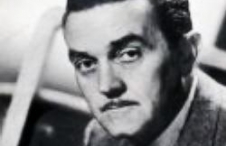Bob Bailey
Dr. William H. "Bob" Bailey came to Las Vegas as an entertainer at a historic hotel-casino, and stayed to make history as a civil rights pioneer and contributor to Las Vegas' transformation from a small, segregated gambling town to an integrated metropolis.
Bailey demonstrated his philosophy that education and training are the keys to success, and he provided many educational opportunities for minorities to prepare themselves for lives of equality and equity. Born in Detroit and raised in Cleveland, Bailey received a B.A. in business law at Morehouse College in Atlanta. He also attended the School of Radio and Television in New York City and engaged in specialized studies at the Columbia Theater. He attended the University of Nevada, Las Vegas, for classes in real estate and land law. Sponsored by U.S. Senator Alan Bible, Bailey was in the first graduating class of the Institute of Minority Business Education at the Howard University School of Business in Washington, D.C. Dr. Bailey received a Doctorate of Humane Letters from National University, San Diego, California, in 1987.
Bailey came to Las Vegas in 1955 to serve as an emcee and performer at the historic Moulin Rouge, the first integrated hotel-casino in Las Vegas. The Moulin Rouge soon closed, but Nevada's first Black doctor, Charles I. West, encouraged Bailey to remain in Las Vegas. He did, and eventually took on local television, producing a program for KLAS Channel 8, and later hosting a show on Channel 13 that aired from the Fremont Hotel. A civil rights pioneer in Las Vegas entertainment and broadcasting, Bailey soon branched out into other aspects of the civil rights movement.
Bailey's determined advocacy of training and education became a paramount element of the civil rights struggle. He believed that when the doors of opportunity were opened to those who had formerly been discriminated against, those people should be prepared to function in an open society. So, he established several training programs in different categories. He developed a radio training school for Black youths under the Federal Concentrated Employment Program (CEP). This project was a forerunner of KCEP radio and an early program of the highly effective Clark County Economic Opportunity Board. Through that agency, Bailey established a dealers' training school for minorities and, with the valued assistance of Lubertha Johnson's Operation Independence Program and the Stardust Hotel's casino management team, the first joint training program for black dealers planning for employment at Las Vegas casinos. Additionally, he installed the first on-the-job training program for minorities at the Circus Circus Hotel and Casino.
Bailey has been an outspoken advocate for minority small businesses and self-sufficiency for nearly a half century. He formed the Nevada Economic Development Company (NEDCO), which orchestrated and produced the nation's most successful minority business procurement conference. While under Bailey's direction, NEDCO raised over $300 million in financial capital. Bailey also helped develop the Latin Chamber of Commerce, the Minority Business Council, and the Minority Contractors Association. He served on the organizing board of the Black Chamber of Commerce (now known as the Urban Chamber). Today, these organizations comprise the infrastructure that aid and support minorities entering Nevada's professional workforce.
In the early 1960s, with the civil rights movement at its height both locally and nationally, Governor Grant Sawyer appointed Bailey chairman of the Equal Rights Commission. Remembering those tumultuous and troubled times in his oral history, Hang Tough, Sawyer recalled, "Among the spokesmen for the NAACP who would come to Carson City to put pressure on the state government were Charles Kellar, Eddie Scott, Dr. James McMillan, William H. "Bob" Bailey, and Dr. Charles West. Each in his own way was very forcefulbut Bob Bailey may have been the most adept at balancing a passion for justice with an understanding of how to go about getting a system to reform itself."
President George Bush named Bailey deputy director of the U.S. Department of Commerce's Minority Business Development Agency, where he organized and acted as co-leaser of the first minority business matchmaker delegation to the Persian Gulf after Operation Desert Storm in 1991. Bailey included Nevadans in this historic event co-sponsored by the International Trade Administration and sanctioned by the U.S. Department of Commerce and the White House. The delegation generated $30 million to enable minority-owned businesses to help rebuild Kuwait. Upon returning to Las Vegas, Bailey was drafted for the position of president of the National Association of Minority Businesses (NAMB).
In addition to his involvement in various training programs and minority business development, Bailey maintained an interest in developing cultural activities. Early on, he worked with Antonio Moselli, the Sands Hotel's orchestra conductor, who annually presented choral concerts in Las Vegas at Easter, Christmas, and other holidays. For five years, he produced Vocal Extravaganza in Black, which highlighted choirs from Black universities and colleges holding concerts in Las Vegas. Bailey produced and directed Talk of the Town, the first all-Black television show in the nation, which was conceived by its host, Alice Key.
Nevadans have recognized Bailey's achievements. Bailey has been inducted into KLAS Channel 8's Wall of Fame for producing and directing Talk of the Town. On May 27, 1999, the Nevada legislature honored Bob Bailey and his wife of more than fifty years, Anna L. Bailey, for outstanding and meritorious service to the state. His proudest moment came in the fall of 2005, with the opening of the new William H. "Bob" Bailey Middle School at 2500 North Hollywood Boulevard, a mile from the base of Sunrise Mountain.
Article Locations
Related Articles
Further Reading
None at this time.

